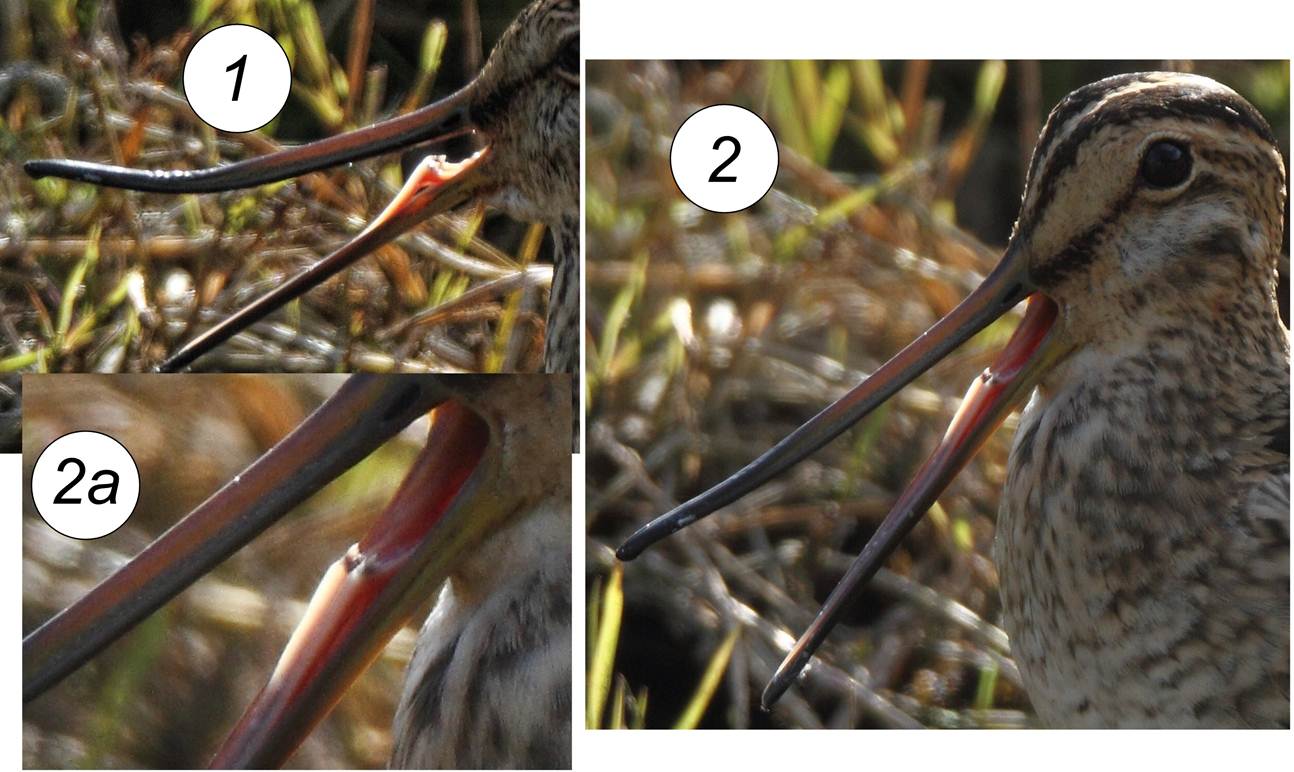Thank you Philip
(The usual spelling seems to be ‘rhynchokinesis’)
There are some photos on websites showing bill flexing, but not for Latham’s Snipe or as extreme as my examples. I think my bird, for at least 6 minutes, was cleaning and exercising its bill at the end of the day. One ARKIVE shot shows a snipe with the hinge of its tongue (if I can call it that) against the upper mandible - I have a poor shot rather similar. Here are a couple more. (I am not one to let a poor photo stand in the way of a contribution to science.)

Number (1) shows the upper mandible flexed to the point that compression wrinkles have appeared on the upper surface. It also shows the tongue hinge beginning to work. The hinge as shown in (2) is enlarged at (2a). This clearly shows hooks (or barbs) that are presumably used to haul the earthworm into the mouth, perhaps with the bill remaining closed. Not details readily apparent in a typical view of the species in the field.
‘Today tonight’ is the name of (as self-described) ‘Australia’s number one current affair program’ which aims, each evening, to review the events of the day, like my initial offering. I don’t watch it, but I know what it is.
From: Philip Veerman [
Sent: Saturday, 8 December 2012 10:27 PM
To: 'Bob Rusk'; 'Geoffrey Dabb'; ; Con Boekel
Subject: [canberrabirds] Today tonight or explanation of rynchokinesis
Sorry I'm lost at the "Today tonight".
This is called rynchokinesis and it is potential possible to a limited extent in most birds, however it is well known in several birds and most particularly marked in these waders. It is easy to explain if I have a bird's skull in my hand. Suffice to say the hinge in the jaw of birds is entirely different to mammals (that is to say it is mammals that are strange). The way birds do this is the quadrate bone to which the lower jaw is attached, is moved forwards and the palatine bone slides back and forth, thus enabling the flexible upper mandible to bend upwards or sometimes they can twist as well to add a sideways movement. This hinging obviously can only change the shape of the upper mandible.
See this prior message from January 2010:
Philip Veerman
24 Castley Circuit
Kambah ACT 2902
02 - 62314041
While surfing the net today I came across a request for info about "rhynchokinesis".
For those birdwatchers who have never heard of "rhynchokinesis" and/or have never seen it in action
check out this page of Trevor Ford's website: http://www.sunbittern.com/gallery-rhynchokinesis.html
"Rhynchokinesis" is the ability of some birds to be able to flex their upper mandible.
It is probably most often seen in godwits but I have observed it to some degree or other in several
species of shorebirds and have photographed evidence of it a number of times. Keen bird-photographers (probably not photographers who simply take photos with birds in them)
should carefully examine all of their shorebird photos (in particular) for evidence of the act -
they might be surprised.
Bob Inglis
Sandstone Point
Qld
Australia
http://users.tpg.com.au/inglisrc/
-----Original Message-----From: Bob Rusk [m("rocketmail.com","bobrusk");">] Sent: Saturday, 8 December 2012 10:00 PM To: Geoffrey Dabb; m("canberrabirds.org.au","canberrabirds");"> Subject: Re: [canberrabirds] Today tonight
I've seen this done more than a couple of times with Bar-tailed Godwits when "yawning", but when you think about it, the bill would have to be flexible to enable the bird to feed. It would be virtually impossible to open their bills " chop stick fashion" for the intake of food when they are immersed in mud or sand to the full length. Obviously the lower half is flexible and sensitive enough to open at the extremities to enable them to take "prey" with a tweezer like action when detected. What do you reckon.
PS- No differences of opinion will be tolerated
Con - I have several shots illustrating the curious geometrics of this bird’s open bill. I do not know what it was doing but Alastair and I speculated it might have been trying to eject something, and we discussed the upcurve of the upper mandible, evident to the naked eye. (Alastair thought he might have read something about that …) Clearly the bill is surprisingly flexible. The below shot is not edited in any material respect. As to what the bird said, well I have had to do a little translating there ..
Geoffry
I hate to snipe at true art, but how come the top bill curves upwards the bottom bill is straight?
regards
Con
On 8/12/2012 7:36 PM, Geoffrey Dabb wrote:

